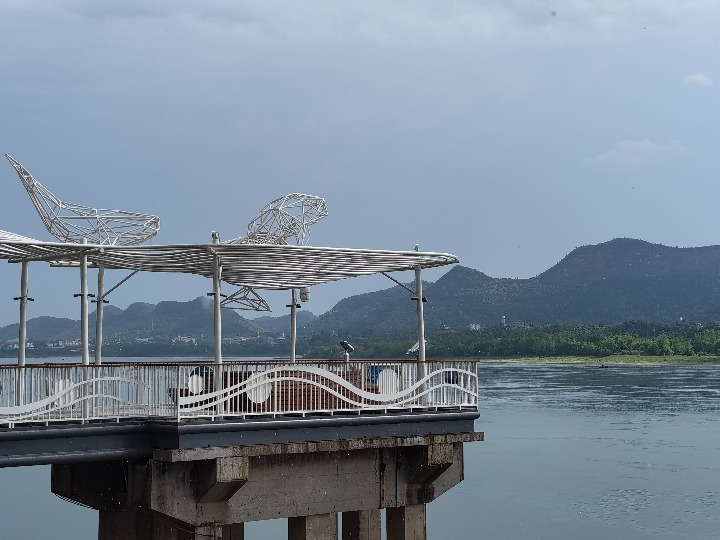Old Yangtze oil wharf swaps pipelines for porpoises
Xinhua
Published: May 4 (UTC+8), 13:22
Updated: May 4 (UTC+8), 14:28

by Xinhua writers Wang Tianyu, Wang Xian
WUHAN, May 4 (Xinhua) -- When the weather is good, Wang Lifeng often shoots videos and watches finless porpoises from a unique viewing platform, which was once a wharf used to transport oil for the Wangjiahe oil depot, where Wang used to work.
The wharf was demolished as it was located in the Chinese sturgeon reserve in the city of Yichang, central China's Hubei Province. After losing its oil source, the Wangjiahe oil depot, built over 60 years ago, was closed. A new oil depot was built by Sinopec more than 60 km away in Zhijiang City to replace the decommissioned Wangjiahe site.
When hearing the news that the Wangjiahe oil depot would be closed, Wang at first was reluctant to leave for Zhijiang to work, as she had a unique attachment to the old oil depot.
"After all, I worked here for a long time," Wang said.
Officials of the Yichang branch of Sinopec spoke with the employees to help them realize the importance of demolishing the wharf and relocating the oil depot. Wang and her colleagues came to understand the need to protect their mother river, which benefits both current and future generations.
On April 8, 2021, the wharf was demolished, but part of it remained and was transformed into a finless porpoise viewing platform, and also an education base for Yangtze River conservation.
"We can't just dismantle it and erase the city's memory. We must both protect the environment and educate future generations," said Xiao Anhua, head of the Hubei Yichang branch of Sinopec.
Now the viewing platform has risen to fame online, and local people enjoy taking photos and videos here. "The wharf and barges did a certain degree of damage to the Yangtze River while transporting oil. Now looking at the clear water and lush greenery along the Yangtze, I feel that I have made concrete contributions to protecting our mother river," said Wang.
"Since the wharf was demolished, the number of finless porpoises that usually live here has grown to five, and the migration path of Chinese sturgeon has become smoother," said Wu Yupu, an official with the management office of the Chinese sturgeon nature reserve in Yichang.
The relocation of the Wangjiahe oil depot and transformation of its wharf epitomize how people are making efforts to protect the Yangtze River.
Since 2016, Sinopec has shut down eight oil depots on the riverside, closed 17 oil wharves along the river, and demolished and relocated 12 river gas stations, with a total investment of around 3.7 billion yuan (about 560 million U.S. dollars), according to Jing Yajun from the Hubei petroleum branch of Sinopec.
The newly built Zhijiang oil depot is also a vivid display of environmental protection in action. For instance, to save the precious waterfront resources along the Yangtze River, the Zhijiang oil depot shares the wharf with two other oil depots, realizing the co-construction and sharing of pipelines and other facilities.
"For environmental protection, the Wangjiahe oil depot was demolished and the Zhijiang oil depot has been built. We must pass on this concept and spirit," said Liu Zhen, director of the Zhijiang oil depot.






